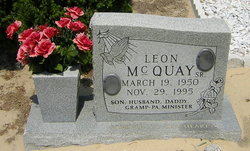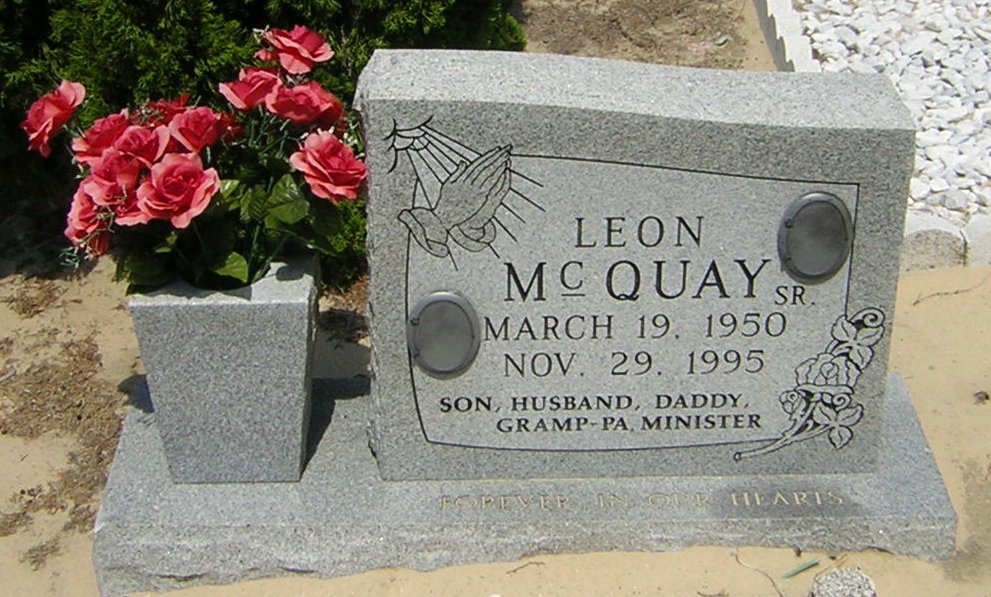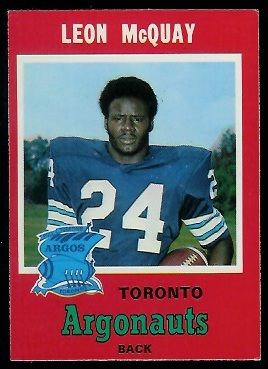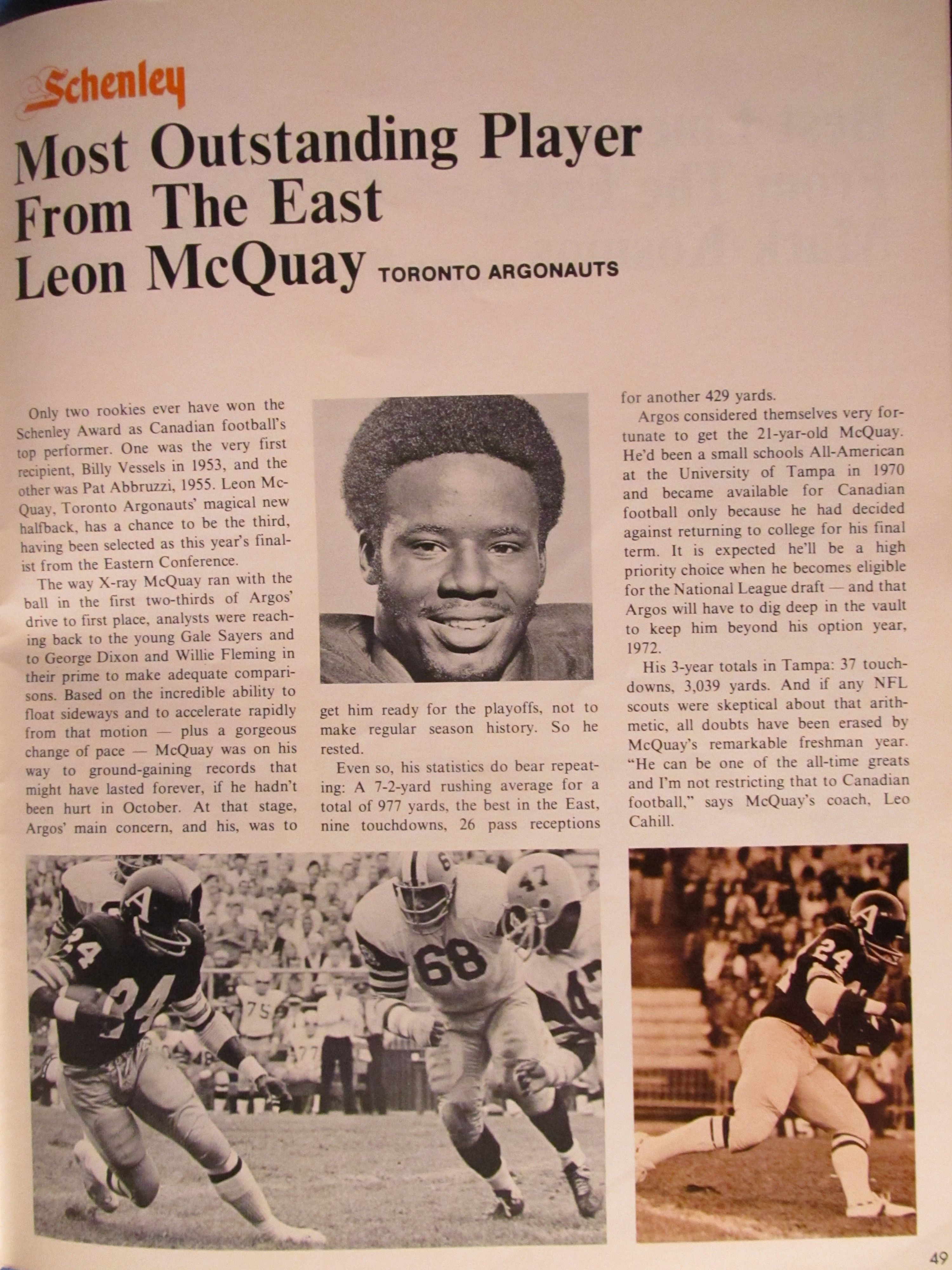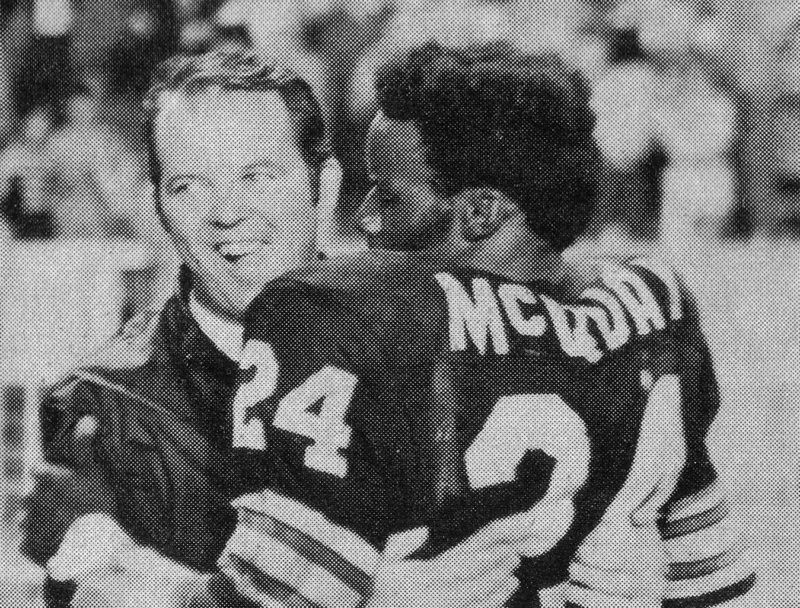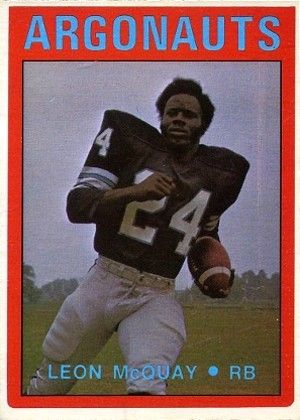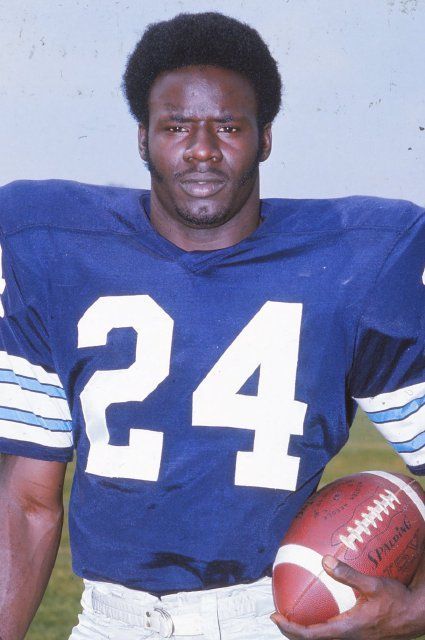Though one of magnificent physique and perfect health as a younger man, in recent years McQuay was plagued by high blood pressure and diabetes, those maladies combining to stop his stout heart. He was 45.
But as was told in prose and in melody to an overflow assembly of more than 300 on Saturday's brilliant afternoon at the Allen Temple A.M.E. Church, Leon McQuay's life was one of stunning athletic success, one that took a downturn for a while but rebounded as "he found Christ, became a minister, then lived that born-again experience much of the last part of his short life," said his mother, Margaret.
Leon McQuay simply was the best running back ever at the University of Tampa, which began its football program in 1933 and abandoned it after the 1974 season.
Breakaway runner
McQuay also was the first black recruited to play football for the Spartans, a challenge he took up willingly and overcame. It was Fran Curci who recruited McQuay out of then all-black Blake High School where now-Rev. Abe Brown was coaching.
"Leon made us both good coaches," Brown said. "I remember when I went to Blake High he was a guard who was all but intercepting pitches in the other team's backfield. But I made him a back so he could have a college career at 5-10 and 200. On his first play as a back in 1967, he took a quick pitch and went 80 yards for a touchdown. He never stopped scoring touchdowns until his career was over."
That career, under Curci from 1968 to 1970 at UT, produced seasons of 7-3, 8-2 and 10-1, a national No. 1 small college rating for the Spartans, All-American honors for McQuay and big money to leave after his junior year for the Canadian Football League and the fast lane. He also played with the New York Giants, New England and New Orleans of the NFL. The New York Times carried his obituary.
My, my but he could run with the football. He could run forward, even sideways. He had a quick burst, a stunning change of direction, a stop-and-go-and-hop technique like Barry Sanders of the Detroit Lions uses today. Why, he scored five touchdowns at Southwestern Louisiana in one game.
"Remember, for a time we had a thing here called the Jesuit Track Meet for the state colleges and high schools," Curci said. "We didn't have a track team but I entered Leon in the 100-yard dash for us. He had almost no experience. He finished second, running the 100 in 9.8 seconds. Not bad."
Breaking down barriers
In 1970, when Leon had made All-American, I visited him and his mom at their home. She told this story:
"On the second Sunday of October 1967 when he was a senior at Blake, Leon decided he was going to play football for the University of Tampa. He was sitting right here at this kitchen table reading the paper and he read where Tulsa had beaten the Spartans 77-0. "I've made up my mind. I'm going to Tampa. They need me,' he said. I said, "Leon, you know they're not recruiting any colored boys now,' but he said, "They will.' "
They did. When Curci got the job after the 1967 season, McQuay was the first recruit he went after. McQuay became the foundation for UT's successful teams.
Along the way, Leon married, had children (one son, Leon Jr., played well at King High), cut hair, preached and became a successful mechanic. His acceptance speech on induction to the UT Hall of Fame in 1983, without notes, was the most compelling ever, said teammate Rick Thomas.
His widow, Ethel Marie, offered in poem, in part, this, in the funeral program: "There is no difficulty that enough love will not conquer, No disease that enough love will not heal, No gulf that enough love will not throw down, No sin that enough love will not redeem."
Pastor John F. Green likened Leon's success in football to his success in "finding the Lord. Both are great victories," he said.
"I loved my son so," Margaret McQuay said. "I guess I loved the first and last parts of his life most. He was not always angelic but aren't the only angels in heaven?"
Source: Friends sing praises about McQuay's life
The Tampa Tribune (FL):
December 10, 1995
Author: TOM MCEWEN
Note: There are 2 photos on the headstone.
Though one of magnificent physique and perfect health as a younger man, in recent years McQuay was plagued by high blood pressure and diabetes, those maladies combining to stop his stout heart. He was 45.
But as was told in prose and in melody to an overflow assembly of more than 300 on Saturday's brilliant afternoon at the Allen Temple A.M.E. Church, Leon McQuay's life was one of stunning athletic success, one that took a downturn for a while but rebounded as "he found Christ, became a minister, then lived that born-again experience much of the last part of his short life," said his mother, Margaret.
Leon McQuay simply was the best running back ever at the University of Tampa, which began its football program in 1933 and abandoned it after the 1974 season.
Breakaway runner
McQuay also was the first black recruited to play football for the Spartans, a challenge he took up willingly and overcame. It was Fran Curci who recruited McQuay out of then all-black Blake High School where now-Rev. Abe Brown was coaching.
"Leon made us both good coaches," Brown said. "I remember when I went to Blake High he was a guard who was all but intercepting pitches in the other team's backfield. But I made him a back so he could have a college career at 5-10 and 200. On his first play as a back in 1967, he took a quick pitch and went 80 yards for a touchdown. He never stopped scoring touchdowns until his career was over."
That career, under Curci from 1968 to 1970 at UT, produced seasons of 7-3, 8-2 and 10-1, a national No. 1 small college rating for the Spartans, All-American honors for McQuay and big money to leave after his junior year for the Canadian Football League and the fast lane. He also played with the New York Giants, New England and New Orleans of the NFL. The New York Times carried his obituary.
My, my but he could run with the football. He could run forward, even sideways. He had a quick burst, a stunning change of direction, a stop-and-go-and-hop technique like Barry Sanders of the Detroit Lions uses today. Why, he scored five touchdowns at Southwestern Louisiana in one game.
"Remember, for a time we had a thing here called the Jesuit Track Meet for the state colleges and high schools," Curci said. "We didn't have a track team but I entered Leon in the 100-yard dash for us. He had almost no experience. He finished second, running the 100 in 9.8 seconds. Not bad."
Breaking down barriers
In 1970, when Leon had made All-American, I visited him and his mom at their home. She told this story:
"On the second Sunday of October 1967 when he was a senior at Blake, Leon decided he was going to play football for the University of Tampa. He was sitting right here at this kitchen table reading the paper and he read where Tulsa had beaten the Spartans 77-0. "I've made up my mind. I'm going to Tampa. They need me,' he said. I said, "Leon, you know they're not recruiting any colored boys now,' but he said, "They will.' "
They did. When Curci got the job after the 1967 season, McQuay was the first recruit he went after. McQuay became the foundation for UT's successful teams.
Along the way, Leon married, had children (one son, Leon Jr., played well at King High), cut hair, preached and became a successful mechanic. His acceptance speech on induction to the UT Hall of Fame in 1983, without notes, was the most compelling ever, said teammate Rick Thomas.
His widow, Ethel Marie, offered in poem, in part, this, in the funeral program: "There is no difficulty that enough love will not conquer, No disease that enough love will not heal, No gulf that enough love will not throw down, No sin that enough love will not redeem."
Pastor John F. Green likened Leon's success in football to his success in "finding the Lord. Both are great victories," he said.
"I loved my son so," Margaret McQuay said. "I guess I loved the first and last parts of his life most. He was not always angelic but aren't the only angels in heaven?"
Source: Friends sing praises about McQuay's life
The Tampa Tribune (FL):
December 10, 1995
Author: TOM MCEWEN
Note: There are 2 photos on the headstone.
Inscription
Son, husband, daddy, Gramp-pa, minister
Family Members
Sponsored by Ancestry
Advertisement
Advertisement
